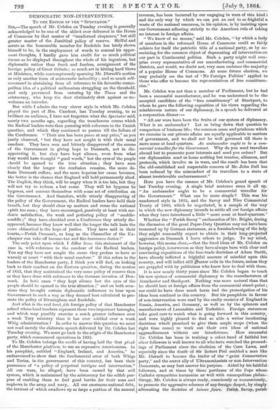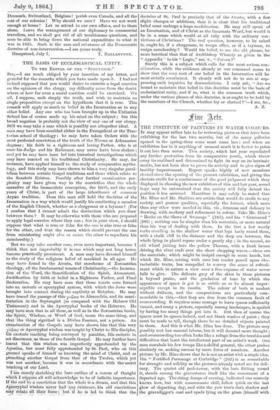DEMOCRATIC NON-INTERVENTION.
To THE EDITOR OF THE 66 SPECTAiOR."
SIB,—The speech of Mi. Cobden on Tuesday evening is generally acknowledged to be one of the ablest ever delivered in the House of Commons by that master of "unadorned eloquence," but still greater master of the Jesuitical policy of reserve. Skilful and astute as the honourable member for Rochdale has lately shown himself to be, in the employment of words to conceal his upper- most thoughts, I hardly gave him credit for so much political finesse as he displayed throughout the whole of his ingenious, but diplomatic rather than frank and fearless, arraignment of the foreign policy of Great Britain; so much art in hitting hard blows at Ministers, While contemptuously spurning Mr. Disraeli's motion as only another form of aristocratic imbecility ; -and HO much self- command in abstaining from all reference to his favourite cosmo- politan idea of a political millennium struggling on the threshold, and only prevented from entering by the Times and the aristocracy, who keep the door obstinately shut against so un- welcome an intruder.
But while I admire the very clever style in which Mr. Cobden played the part of Mrs. Candour, last Tuesday evening, to so brilliant an audience, I have not forgotten what the Spectator said, nearly two months ago, regarding the treaeherous course which the Radical leaders were then pursuing with reference to the Danish question, and which they continued to pursue till the failure of the Conference. "Their aim has been peace at any price," as you justly observed, "but they have not sought it with their usual candour. They have seen and bitterly disapproved of the course of the Government in giving hope to Denmark, not in dis- appointing it, but they. have kept silence, even from what they would have thought "good words," lest the eyes of the people should be opened to the true situation ; they have seen clearly that the longer the confusion remains, the more de- feats Denmark suffers, and the more hopeless her cause becomes, the better is the chance that England will hold permanently aloof. The English, they think, will be angry when it is too late, but they will not try to redeem a lost cause. They will let bygones be bygones, and content themselves with some act of retribution on the Government. And therefore, while utterly disapproving of the policy of the Government, the Radical leaders have held their breath, lest they should clear up matters and rouse the national spirit too soon ; they have encouraged, passively at least with sar- donic satisfaction, the weak and pottering policy of "meddle- muddle ;" they have chuckled over a Conference they utterly dis- approved, because they know well that the longer the talk lasts the more chimerical is the hope of justice. They have said in their hearts,—Perish Denmark, so long as the Chancellor of the Ex- chequer can take off income-tax and fire-insurance duties !"
The only point upon which I differ from this statement of the case is, with reference to the candour of the Radical leaders. You say they have not sought the cause they profess to have so warmly at heart "with their usual candour." if this refers to the leaders of the Manchester party, I think you will find, on looking back to their conduct on the Eastern question, during the session of 1853, that they maintained the very same policy of reserve then as they have done with reference to the German invasion of Den- mark. In both cases "they kept silence lest the eyes of the people should be opened to the true situation ;" and on both occa- sions they brought certain diplomatic influences to bear upon Government in such a way as they deemed best calculated to pro- mote the policy of Birmingham and Rochdale.
And what is the real bond fide foreign policy of that Manchester school whose head teachers represent those two important boroughs, and which may possibly exercise a much greater influence over a weak Tory ministry than it has ever wielded over a weak Whig administration ? In order to answer this question we must not read merely the elaborate speech delivered by Mr. Cobden last Tuesday evening. We must go bulk to the origin of the Manchester party, which commenced operations in 1835.
To Mr. Cobden belongs the credit of having laid the first plonk of the Manchester platform, to use an expressive Americanism. In his pamphlet, entitled "England, Ireland, and America," he endeavoured to show that the fundamental error of both Whigs and Tories, in the government of this country, has been their pursuance of "a policy of perpetual intrigue and intervention." All our wars, he alleged, have been caused by that evil system, which is maintained by the aristocracy for the selfish pur- pose of enabling them to find good berths for their sons and nephews in the army and navy.. All our enormous national debt, the interest of which swallows up so large a portion of the annual,
revenue, has been incurred by our engaging in wars of this kind ; and the only way by which we can put an end to so frightful a waste of the national resources, in his opinion, is by insisting upon our Government adhering strictly to the American rule of taking no interest in foreign affairs.
"We know of no means," said Mr. Cobden, "by which a body of members in the reformed House of Commons could so fairly achieve for itself the patriotic title of a national party, as by as- sociating for the common object of deprecating all intervention on our part in Continental politics. Such a party might well com- prise every representative of our manufacturing and commercial districts, and would, we doubt not, very soon embrace the majority . of a popular House of Commons. At some future election, we may probably see the test of No Foreign Polities' applied to those who offer to become the representatives of free constituen- cies."
Mr. Cobden was not then a member of Parliament, but he had been a successful manufacturer, and he was understood to be the accepted candidate of the "free constituency" of Stockport, to whom he gave the following exposition of his views regarding the mischievous nature of our diplomacy, in a speech he delivered at a corporation dinner:—
" All our wars have been the fruits of our system of diplomacy. What is an ambassador ? Let us bring down that question to comparison of business life ; the common sense and prudence which we exercise in our private affairs are equally applicable to matters of government, and we shall not be well governed till there is more sense at head-quarters. An ambassador ought to be a com- mercial travellerfor the Government. Why do you send travellers abroad but to prosecute your interests and send you orders? But our diplomatists send us home nothing but treaties, alliances, and protocols, which involve us in wars, and the result has been that the old-established and respectable concern of Mr. John Bull has been reduced by the misconduct of its travellers to a state of almost irretrievable embarrassment."
Here you have the essence of Mr. Cobden's grand speech of last Tuesday evening. A single brief sentence sums it all up. "An ambassador ought to be a commercial traveller for the Government." What can be more simple'? This was his unadorned style in 1835, and the Savoy and Nice Commercial Treaty of 1860, which he negotiated, is a sample of the way in which the new diplomacy intends to settle all our foreign affairs when they have introduced a little " more sense at head-quarters."
Whether the "Perish Savoy" exclamation of Mr. Bright, during the discussion of the great Paper-Duty Question may not have been treasured up by German statesmen, as a foreshadowing of the help they might reasonably expect to obtain in their long-projected aggression on Denmark I leave others to judge. To my mind, however, this seems clear,—that the fixed ideas of Mr. Cobden on foreign policy, interwoven as they have always been with clear and Convincing expositions of the free-trade doctrines of Adam Smith, have already inflicted a frightful amount of mischief upon this country, and will inflict still treater evils in the future, unless they are grappled with by politicians who know how to deal with them.
It is now nearly thirty years since Mr. Cobden began to teach his new system of commercial diplomacy to the manufacturers of Manchester and Stockport Nothing was more natural than that he should look at foreign affairs from the commercial stand-point ; nor could he have done much harm had the promulgation of his ideas been confined to this country. But his pamphlets in favour of non-intervention were read by the crafty enemies of England in Russia, America, arid Germany, as well as by the spinners and manufacturerti of Lancashire and Yorkshire. Foreign statesmen take good careto watch what is going forward in this country, and were highly pleased to find so able a writer inculcating doctrines which promised to give them ample scope (when the right time came) to work out their own ideas of national aggrandizement without our interference. How successful Mr. Cobden has been in training a select band of faithful but silent followers is well known to all who have watched the proceed- ings of Parliament since the abolition of the Corn Laws, and especially since the death of Sir Robert Peel enabled a man like Mr. Disraeli to become the leader of the "great Conservative party," and the secret ally of ITItramontanista or non-Intervention Democrats, as may best answer-his purpose. Aided by his faithful followers, and at times by those partizans of the Pope whose Catholic sympathies harmonize so well with cosmopolitan philan- thropy, Mr. Cobden is always ready, consciously or unconsciously, to promote the aggressive schemes of any foreign despot, by simply advocating the doctrine of laissez faire. Perish Savoy, perish Denmark, Switzerland, Belgium I perish even Canada, and all the rest of our colonies ! Why should we care ? Have we not work enough at home? Let us attend to our own affairs, and to them alone. Leave the management of our diplomacy to commercial travellers, and we shall get rid of all troublesome questions, and soon be able to bring down the national expenditure to what it was in 1835. Such is the sum and substance of the Democratic doctrine of non-intervention.—I am yours truly,































 Previous page
Previous page